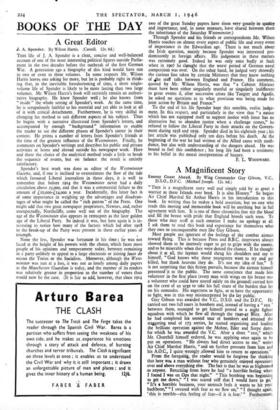BOOKS OF THE DAY
A Great Editor
J. A. Spender. By Wilson Harris. (Cassell. 12s. 6d.) THIS life of J. A. Spender is a clear, concise and well-balanced account of one of the most interesting political figures outside Parlia- ment in the two decades before the outbreak of the first German War. A generation ago a biography of this kind would have run to two or even to three volumes. In some respects Mr. Wilson Harris leaves one asking for more, but he is probably right in think- ing that, in the inevitable foreshortening of time, a short single- volume life of Spender is likely to be more lasting than two large volumes. Mr. Wilson Harris's book will certainly remain an authori- tative biography. He knew Spender well ; he also knows from " inside " the whole setting of Spender's work. At the same time, he is scrupulously faithful to his material and yet able to look at all of it with critical detachment. Furthermore, he is very skilful in changing his method to suit different aspects of his subject. Thus he begins with a narrative illustrated from Spender's letters, and accompanied by enough " background " information to enable the reader to see the different phases of Spender's career in their context. He prints a number of letters from Spender's friends at the time of the greatest influence of the Westminster. Finally, he comments on Spender's writings and describes his public and private activities at home and abroad outside his newspaper work. Here and there the choice of the analytical method tends a little to break the sequence of events, but on balance the result is entirely satisfactory.
Spender's best work was done as editor of the Westminster Gazette, and, if one is inclined to overestimate the flow of the tide which favoured Liberal journalism in those days, it is well to remember that before 1914 the Westminster never had a daily circulation above 25,000, and that it was a commercial failure to the amount of kro,000-1J14,000 a year. Incidentally, this latter fact is of some importance in weighing up the advantages and disadvan- tages of what might be called the "rich patron" of the Press. One might add that two great newspaper proprietors, Newnes, and, rather unexpectedly, Northcliffe, come well out of the biography. The age of the Westminster also appears in retrospect as the later golden age of the Liberal Party. So indeed it was, but here again it is in- teresting to notice how many of the factors which led after 1918 to the break-up of the Party were present in these earlier years of triumph.
None the less, Spender was fortunate in his time ; he was not faced at the height of his powers with the choice, which faces most people of his opinions and temperament today, between remaining in a party unlikely to appeal to a large electorate or joining faute de mieux the Tories or the Socialists. Moreover, although the West- minster was run at a loss, it was not as lonely among daily papers as the Manchester Guardian is today, and the number of its readers was relatively greater in proportion to the number of voters than would now be the case. (It is fair to add, however, that since 1914 two of the great Sunday papers have risen very greatly in quality and importance, and, in some measure, have shared between them the inheritance of the Saturday Westminster.) Through Spender and his friends or correspondents Mr. Wilson Harris touches on almost every aspect of public life and every event of importance in the Edwardian age. There is not much about the Irish question, mainly because Spender was interested pre- dominantly in foreign affairs. His judgement in these matters was extremely good. Indeed he was only once badly at fault when in 1907 he thought that the worst period of German naval competition was over. On the other hand, he judged very shrewdly the curious line taken by certain Ministers that they knew nothing of he staff talks between England and France. His comment, quoted by Mr. Wilson Harris, was that "a Cabinet Minister must have been either singularly trustful or singularly indifferent to great events if, after successive crises like Tangier and Agadir, he asked no questions as to what provision was being made for joint action by Britain and France."
To the end of his life Spender kept this sensible, realist judge- ment. In this respect, and particularly in the view that "a nation which has not equipped itself to support justice with force has no alternative but to abandon justice when a challenge comes," he refused to follow the Liberal Party in their attacks on the Govern- ment during 1938 and 1939. Spender died in his eightieth year ; his last article was published only ten days before his death. At the beginning of the war he had written of the Allied cause with confi- dence, but also with understanding of the dangers ahead. He was bound to feel this confidence ; his long life had been a testimony to his belief in the moral interpretation of history.
E. L. WOODWARD.


























 Previous page
Previous page